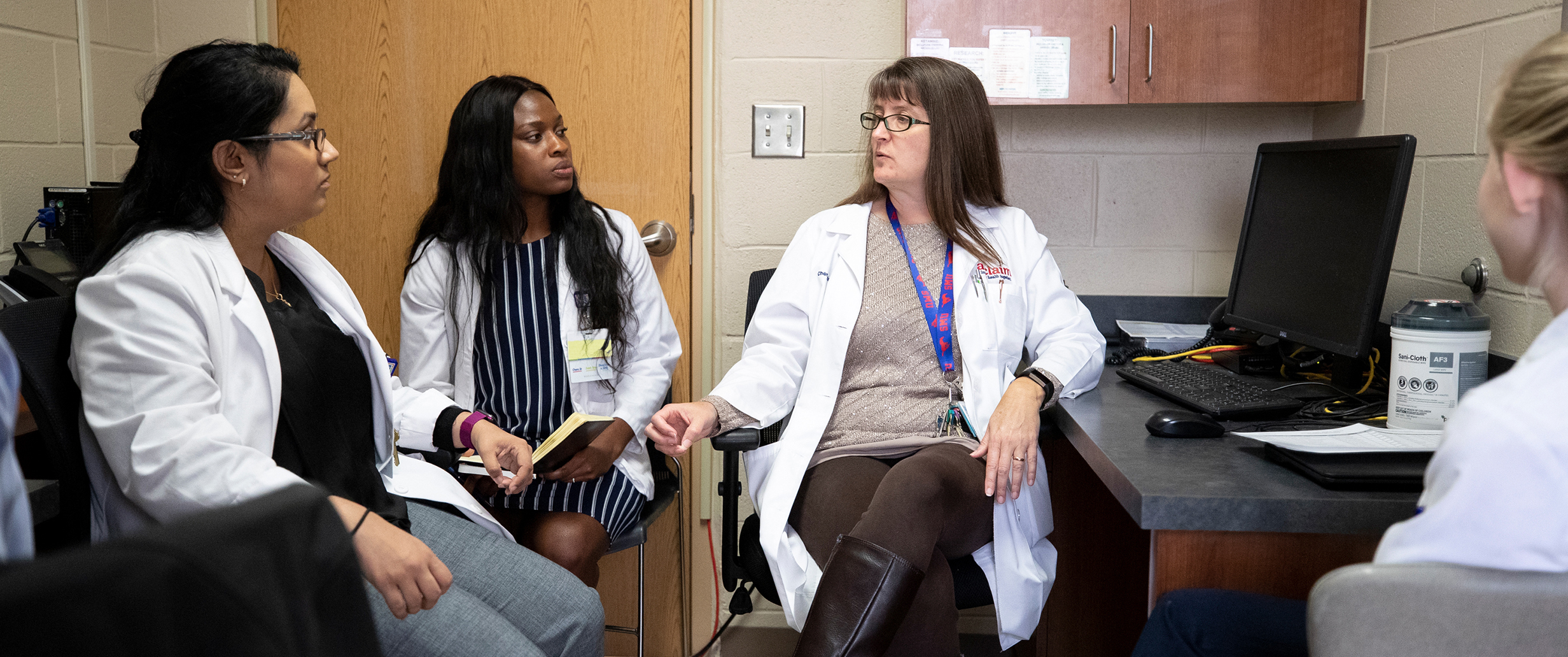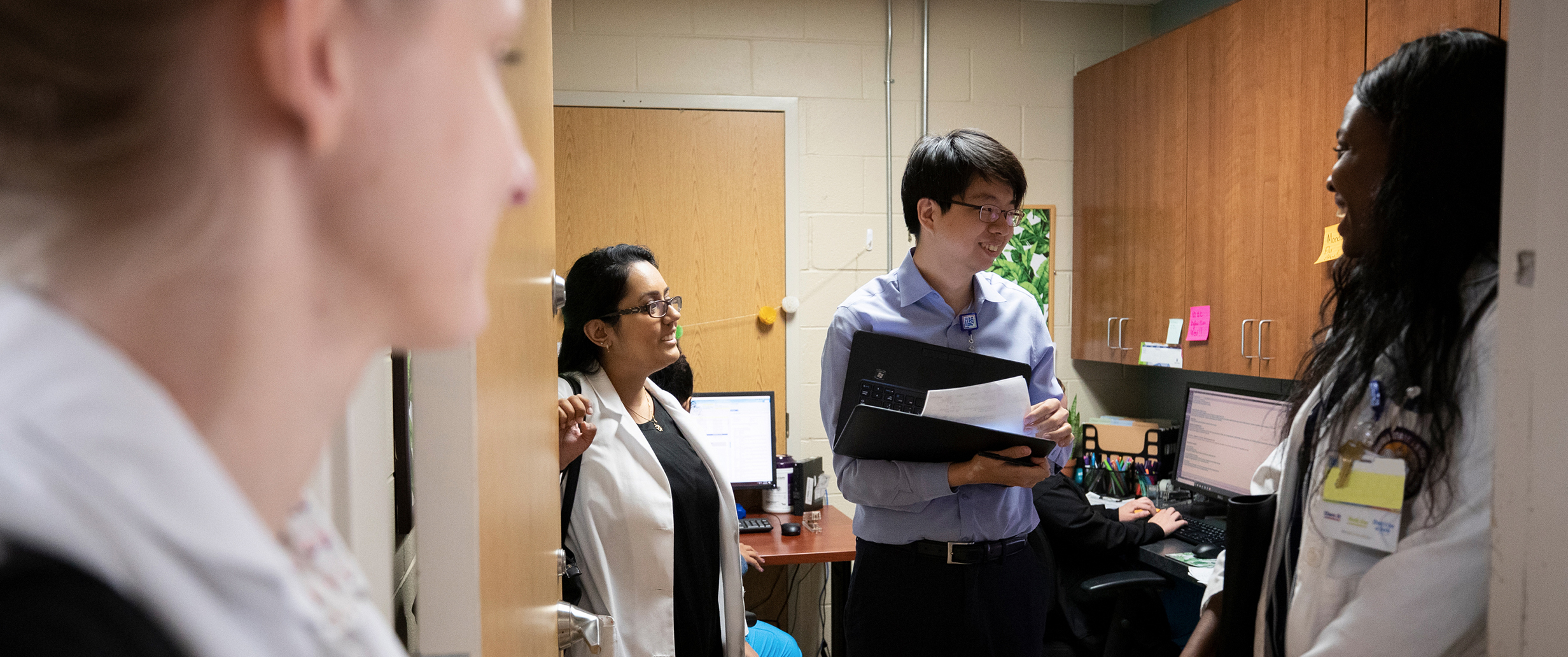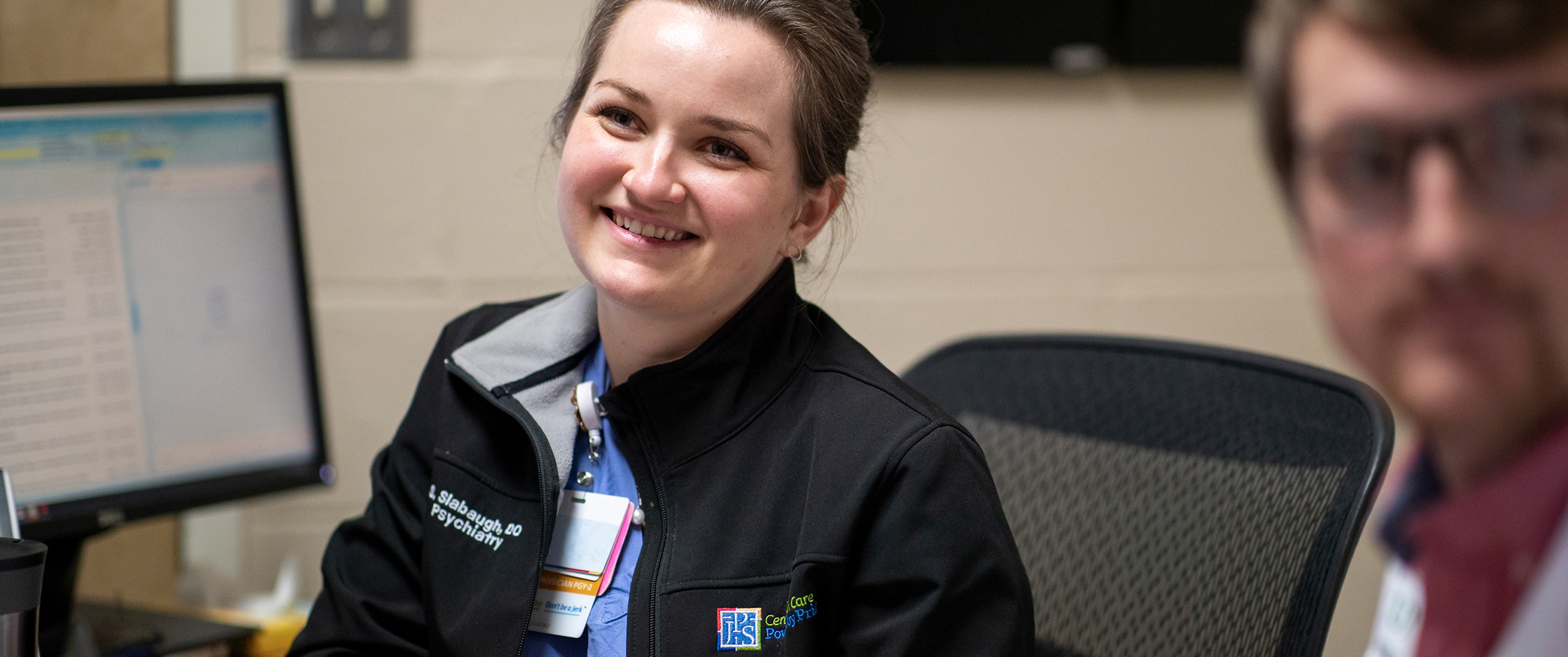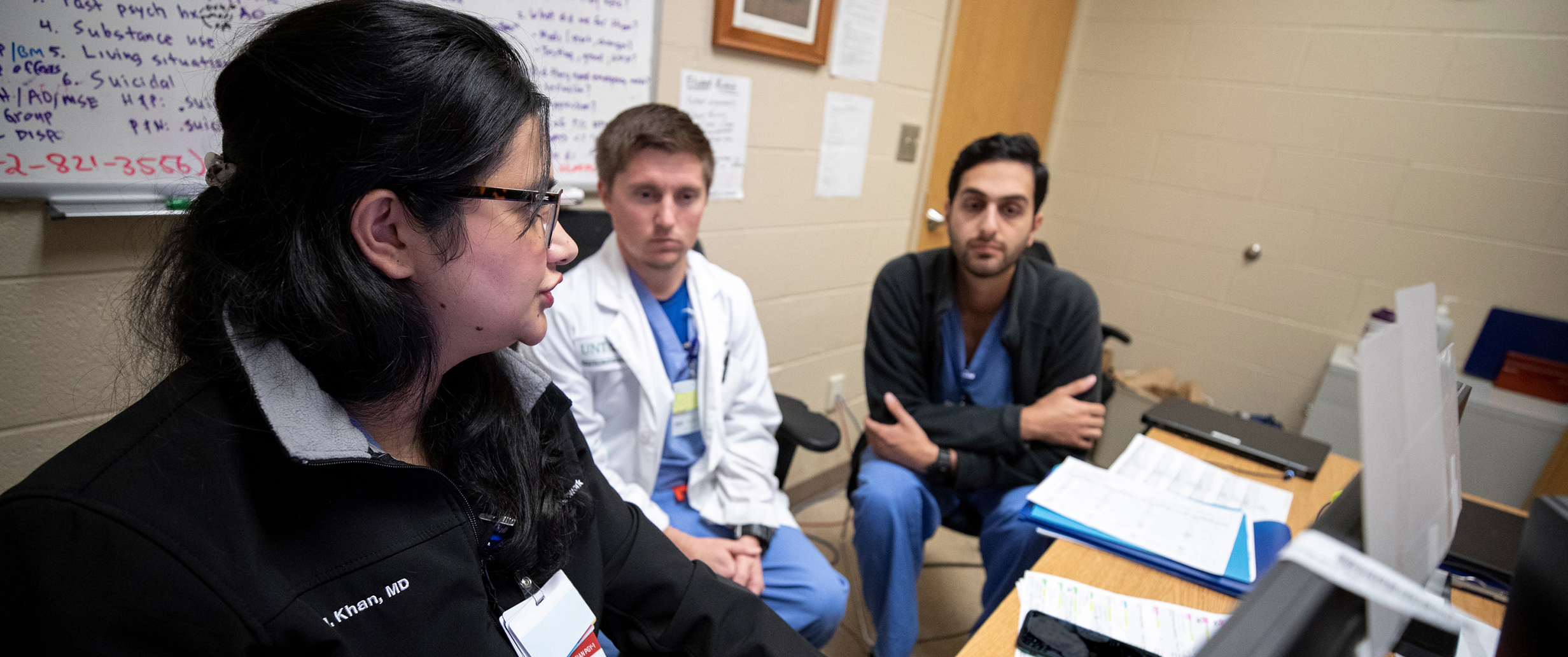Apply to our program
Fourth year medical students may apply online using VSLO for elective clinical clerkships.
Frequently Asked Questions
QUESTIONS RELATED TO APPLYING:
We have interns, including both MD's and DO's, from diverse programs all over the world.
We review applications holistically. Cutoff board exam scores are dependent on the applicant pool each year. We accept both COMLEX and USMLE with no preference for either exam. If you took both exams, please submit both scores.
This is a nationwide problem across all residency programs as students have not been able to take the examination due to the COVID-19 pandemic. This will not be held against you at our program, especially since we know that testing centers have closed. We will review each case on a case-by-case basis.
Audition rotations have traditionally been an opportunity for applicants to gain an "inside look" to experience the program, but are not required.
QUESTIONS RELATED TO TRAINING:
Our institution primarily serves underserved populations within our community, reflecting a high degree of cultural diversity among the patients we treat. In addition, we provide care for individuals with both private and public insurance, including Medicare and Medicaid. The JPS inpatient unit also frequently manages the psychiatric needs of veterans. Additionally, we serve the incarcerated population, particularly in the consult-liaison setting and through PGY-4 electives at MHMR. To support uninsured patients, we offer JPS Connection, a comprehensive patient assistance program designed to enhance access to essential healthcare services.
The patient population presents a broad spectrum of psychiatric conditions, ranging from unipolar depression and bipolar mania to schizophrenia, anxiety disorders, and PTSD. Additionally, trainees at JPS gain exposure to rare psychiatric disorders and the neuropsychiatric manifestations of medical illnesses. Our clinical experience includes the management of complex cases such as scurvy-related neuropsychiatric symptoms, lupus-induced psychosis, Wilson’s disease, and Diogenes syndrome, providing a unique and diverse training environment.
Inpatient psychiatry rotations take place during the PGY-1 and PGY-2 years, providing trainees with a structured learning experience under the direct supervision of an attending psychiatrist. Each inpatient team includes either an intern or a second-year resident working alongside a multidisciplinary team comprising peer support specialists, social workers, charge nurses, students, pharmacists, and other healthcare professionals. Some teams now integrate both an intern and a PGY-2 resident, fostering a collaborative learning environment modeled after traditional inpatient medicine teams. This structure allows interns to benefit from the guidance of both their attending and upper-level residents.
Supervision is a key component of training, ensuring that neither interns nor residents bear sole responsibility for any patient. Attendings provide continuous oversight and protected time to address patient needs when trainees are unavailable. Interns follow a graduated exposure model, progressively increasing their caseload under attending supervision. By the second semester, they are well-equipped to co-manage the entire team alongside their attending. To enhance the learning experience and optimize patient care, several structural improvements have been implemented, including patient caps for weekend call, reduced clinic patient panels, and smaller inpatient team caseloads. These changes have been made possible through the addition of more attending physicians and non-teaching providers, ensuring a balanced and supportive training environment.
PGY-1:
During the first year of training, residents complete on-service rotations at Trinity Springs Pavilion (Inpatient Psychiatry) and the Psychiatric Emergency Center (PEC) on the JPS main campus. Off-service rotations include two months of inpatient internal medicine, managed by JPS Family Medicine residents, as well as one month of urgent care and two months of neurology, all based on the JPS main campus. Additionally, PGY-1s spend one month in outpatient family medicine at the True Worth Center, a clinic dedicated to serving the underserved populations of Fort Worth.
PGY-2:
Second-year residents rotate through various psychiatric services at JPS, including inpatient psychiatry (adult and child), consult-liaison psychiatry, and the psychiatric emergency room. They also complete a one-month rotation at MHMR Pine Street, a local rehabilitation center providing detoxification, adult rehabilitation, and ambulatory programs. Additionally, PGY-2s begin their longitudinal outpatient experience with a half-day clinic at the Center for Behavioral Health Recovery Clinic.
PGY-3:
During the third year, residents dedicate twelve continuous months to outpatient psychiatry at one of several clinical sites, including three JPS Medical Homes and an MHMR Clinic.
PGY-4:
Fourth-year residents gain experience in a variety of specialized settings, including JPS’ Partial Hospitalization Program (PHP) and the Local Commitment Alternative (LCA). They also have the opportunity to tailor their training through elective rotations at various clinics, hospitals, and specialty programs.
Residents interested in psychotherapy training have access to a range of opportunities within the department. Many faculty members have psychodynamic training, and additional resources are available for other psychotherapy modalities. The department also hosts a clinical psychology internship program, further enriching the psychotherapy learning experience.
During PGY-3 and PGY-4, residents are allotted one dedicated afternoon per week for psychotherapy and typically manage 1–3 psychotherapy patients. Additionally, online courses in various evidence-based psychotherapies—including Cognitive Behavioral Therapy (CBT), Trauma-Focused CBT (TF-CBT), and Dialectical Behavior Therapy (DBT)—may be supported through professional development funds. Starting in PGY-2, residents receive $1,500 annually in professional development funds to support their educational growth.
Supervision is an integral part of psychotherapy training. PGY-1 and PGY-2 residents receive weekly supervision in individual, small group, and large group formats. PGY-3 and PGY-4 residents continue to receive weekly individual and large group supervision to refine their therapeutic skills and clinical approach.
Graduates of the JPS General Psychiatry Residency pursue diverse career paths, with many securing attending positions immediately after residency, while others choose to further specialize through fellowship training. JPS residents have successfully matched into competitive fellowship programs in forensic psychiatry, addiction psychiatry, consultation-liaison psychiatry, community psychiatry, and child & adolescent psychiatry, demonstrating the strength of their training and preparation.
Leadership opportunities within the residency program are structured to provide residents with experience in both academic and operational roles. Chief resident responsibilities are divided among four positions: two academic chiefs (junior and senior) and two operations chiefs (junior and senior). Junior chiefs are selected from the PGY-3 class, while senior chiefs are chosen from the PGY-4 class. Additionally, residents can take on leadership roles as resident chairs in key areas such as moonlighting, recruitment, research, mentorship, and well-being. PGY-1 and PGY-2 classes also have designated representative positions. Residents also have the opportunity to serve as House Staff Officers, representing all JPS residency programs. Residents are strongly encouraged to engage in leadership beyond the institution, including at the county, state, and national levels, to further develop their professional and advocacy skills.
Residents are required to complete at least one scholarly activity prior to graduation. Many residents present their work at national and regional conferences, as well as at the annual JPS Research Symposium. Additionally, several residents have successfully published in peer-reviewed medical journals, contributing to the advancement of psychiatric research.
Beginning in PGY-3, residents receive a half-day per week of protected time dedicated to scholarly activity. To support research efforts, the Resident Research Chair serves as a liaison between residents and research faculty, facilitating connections and mentorship for ongoing and new research projects.
QUESTIONS RELATED TO PROFESSIONAL DEVELOPMENT:
Each intern meets monthly with a faculty mentor and PGY-3 or PGY-4 for mentorship and residency advice.
Many residents begin working as attendings after residency and many others decide to enter fellowship. JPS General Psychiatry residents have matched strong fellowship training programs in forensics, addiction, consult-liaison, community, and child & adolescent psychiatry.
Yes. Chief resident duties are divided between two academic chiefs (junior and senior), and two operations chiefs (junior and senior). Junior chiefs are selected from the PGY-3 class, while senior chiefs are from the PGY-4 class. We also have resident chair positions that include moonlighting, recruitment, research, mentorship, and wellbeing. PGY-1 and PGY-2 classes have representative positions. In addition, residents can serve as House Staff Officers, representing all JPS residency programs. Residents are encouraged to be involved in leadership at the county, state, and national level.
Residents are required to complete one scholarly activity by the time they graduate. Residents frequently present at conferences and at our own annual JPS Research Symposium. Many of our residents have also published papers in peer-reviewed medical journals. Starting in PGY-3, residents get a half day per week of protected time for scholarly activity. Our Resident Research Chair serves as a liaison between residents and our research faculty to assist with facilitating connections for research projects.
Residents can begin moonlighting during PGY-2 after passing COMLEX Level 3/USMLE Step 3, obtaining their medical license, and maintaining good academic standing per program director evaluation. We currently have internal moonlighting opportunities available for weekend inpatient psychiatry and psychiatry emergency room shifts, as well as weekday swing shifts within the inpatient psychiatry setting. Our resident moonlighting chair works with the administration to organize and schedule this process for our residents.
QUESTIONS RELATED TO WELLNESS:
Our Employee Assistance Program is a great support and can help residents organize counseling sessions. We also have a wellness coordinator dedicated to all residents at JPS who moderates process groups and presents lectures related to well-being during our didactics. JPS also reimburses Uber/Lyft after a call shift. In addition to our PTO, we also get an additional four Well-being days each year.
Process groups are a form of group psychotherapy targeted to resident issues such as burnout, wellness, and methods of navigating work stress. This provides a safe and confidential space for residents to discuss their challenges with each other. PGY-1s have an hour process group built into didactics weekly. PGY-2s to PGY-4s have an hour process group built into didactic



